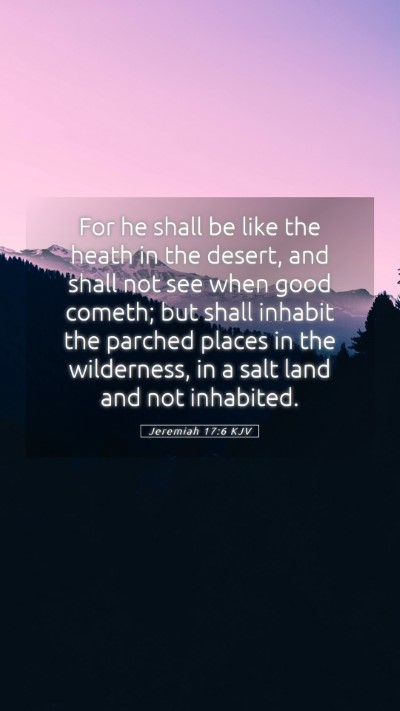Bible Verse Commentary on Jeremiah 17:6
Verse: Jeremiah 17:6 - "For he shall be like the shrub in the desert, and shall not see when good cometh; but shall inhabit the parched places in the wilderness, in a salt land and not inhabited."
This verse speaks volumes about the condition of the heart and the consequences of placing one's trust in man rather than God. Below are insights drawn from various public domain commentaries, integrating their interpretations to provide a comprehensive understanding of this powerful scripture.
Overview
Jeremiah 17:6 serves as a warning about the futility of relying on human wisdom and strength. The imagery of a shrub in the desert symbolizes desolation and unfruitfulness, contrasting with the blessings that come from trusting God. This verse encapsulates the core theme of Jeremiah’s prophetic message—call to repentance and the consequences of turning away from divine sustenance.
Commentary Insights
-
Matthew Henry: Henry emphasizes the spiritual desolation depicted in this verse. The “shrub in the desert” represents individuals who lack the life-giving presence of God. In their reliance on their own strength or human systems, they find themselves spiritually barren, unable to perceive the good that God can provide. This highlights the need for true faith and dependence on the Lord.
-
Albert Barnes: Barnes links this verse to the broader theme of heart disposition in Jeremiah’s message. He elaborates on the “parched places” as symbolic of moral and spiritual aridity. The lack of water reflects the absence of God’s grace, suggesting that those who trust in human resources rather than divine providence will ultimately suffer lack and poverty in their souls.
-
Adam Clarke: Clarke reveals the historical background of the verse, drawing parallels between Jerusalem’s plight and the general condition of those who stray from God. He explains that the “salt land” symbolizes a cursed place devoid of life-sustaining resources, echoing the idea that turning away from God leads to desolation. The lesson here is a stark reminder of the consequences of disobedience and misplaced trust.
Key Themes and Applications
This verse presents several key themes relevant to Bible study insights and understanding Scripture:
- The Condition of the Heart: The depiction of a shrub in a barren land serves as a metaphor for a heart that is estranged from God, underscoring the importance of spiritual vitality.
- Dependence on God: Trusting in human wisdom leads to spiritual dryness. It is essential to cultivate a relationship with God to experience His blessings and guidance.
- Consequences of Sin: The verse warns of the dangers of turning from God. It challenges believers to evaluate where they place their trust and encourages a return to reliance on God’s strength.
Cross References
Jeremiah 17:6 is related to several other Bible verses that reinforce its message:
- Psalm 1:3 - Highlights the blessing of those who delight in the law of the Lord.
- Isaiah 44:3 - Promises blessings to those who trust in God.
- Proverbs 3:5-6 - Encourages trusting in the Lord rather than one’s own understanding.
Conclusion
This in-depth Bible verse analysis of Jeremiah 17:6 serves as a compelling reminder of the necessity of placing trust in God. Through careful examination of the text alongside insights from respected commentators, we can gain a more profound understanding of its significance, which is crucial for any Bible study groups, online Bible study, or personal reflection. As we journey in faith, let this verse prompt us to seek God's guidance continually and avoid the pitfalls of relying on ourselves or others.
For further understanding of difficult Bible passages and exploring thematic connections across scripture, engaging with comprehensive Bible study tools or guides can enhance your study experience.


